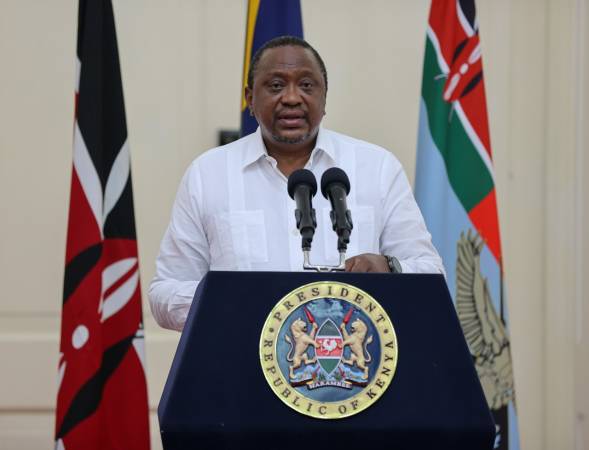Uhuru outlines Sh7b climate change plan
By Hillary.Mageka and Mutuku Mwangangi, November 25, 2021The government has committed to spend up to Sh6.874 billion in a bid to reduce greenhouse gas emissions by 32 per cent by 2030, President Uhuru Kenyatta has disclosed.
Of the amount, Uhuru said Kenya will mobilise 13 per cent from domestic sources while 87 per cent will be funded by external partners.
“We are hopeful that, unlike previous conferences, the Glasgow climate change conference will deliver on funding commitments, which we will attract into a Green Climate Fund,” he said.
He added: “We will also be seeking to attract green investments such as electric boda bodas, launched last week, and to tap into innovative finance such as blended financing to de-risk private investments.”
Rising water levels
Uhuru said these efforts will open new avenues for green manufacturing and create job opportunities.
The President, who is currently on a State visit to South Africa, spoke through video yesterday during the 7th Annual Devolution Conference in Wote, Makueni County.
The theme of this year’s conference is ‘Multi-level Governance for Climate Action’. Sub-theme: Sub-national mobilisation in unlocking the full potential of climate action during and after pandemics.
Globally, Kenya is ranked the 31st most vulnerable country to climate change.
Climate change impacts lead to a loss of about 3 per cent of the Gross Domestic Product (GDP) annually, Uhuru says.
In the last two years, Uhuru said the country has witnessed the worst locust invasion in 25 years, which left about one million people food-insecure in the Horn of Africa.
“The rising water levels of the Rift Valley lakes, Lake Victoria and Turkwel Gorge dam have displaced nearly 400,000 people in 13 counties and affected biodiversity, including flamingoes in Lake Nakuru,” said the President, adding that about 2.5 million people in 23 counties are facing famine because of drought.
In the just concluded COP26 held in Glasgow, Scotland, nearly 200 countries agreed to the Glasgow Climate Pact to keep 1.5C alive and finalise the outstanding elements of the Paris Agreement.
He promised to work with like-minded governments, institutions, businesses and civil society to accelerate action to moderate the negative impacts of climate change.
Besides, Uhuru has promised to facilitate adjustment to expected climate impacts and strengthen capacity to absorb, and recover from climate change effects.
“We have a strong policy and institutional framework for the two levels of government to work together to adapt to climate change and reduce the threat that it currently poses to our country,”he said.
Going forward, the President said his administration will strengthen collaboration and coordination on leveraging on digital technologies to provide real-time climate related data and information to farmers and other stakeholders.
This is in addition to raising awareness and building capacity especially on adaptation with a particular focus on women; who are at the heart of crop and livestock production and who also are the most affected by the adversities of climate change.
This will also involve sharing information and good practices on climate mitigation and adaptation.
“Such examples include climate resilient projects such as mangrove restoration in Gazi at the Coast, the Masue Rock Catchment and Ngai Ndethya Sand Dam in Makueni County and Kinna Livestock Laboratory in Isiolo County,” he said.
Uhuru said his administration has adopted a comprehensive set of policies, rules, and procedures to address climate change.
This effort, he noted, had culminated in the development of the following key instruments: The Climate Change Act (2016), The National Drought Management Authority Act (2016), The National Climate Change Framework Policy (2018) and The National Climate Finance Policy (2018). Others are the National Climate Change Action Plan (2018-2022), the National Adaptation Plan (2015-2030); and, the Green Economy Strategy Implementation Plan (2016-2030).
“These policies are currently being mainstreamed through the sectors in forestry, agriculture, water, energy, waste management and health,” he said.
The head of state termed climate change as not only a future problem but a present one posing serious threat to all countries across the world.
“Climate change poses an existential threat to Kenya even though our role in precipitating the problem is negligible – we contribute less than one per cent of current global greenhouse gas emissions,” he said.
“I note with appreciation, that 33 county governments have developed county-specific laws on climate change, and that a few of them are providing strong leadership on this agenda,” he said adding that Kenya has a pioneering and commanding lead in climate change action on the continent.
